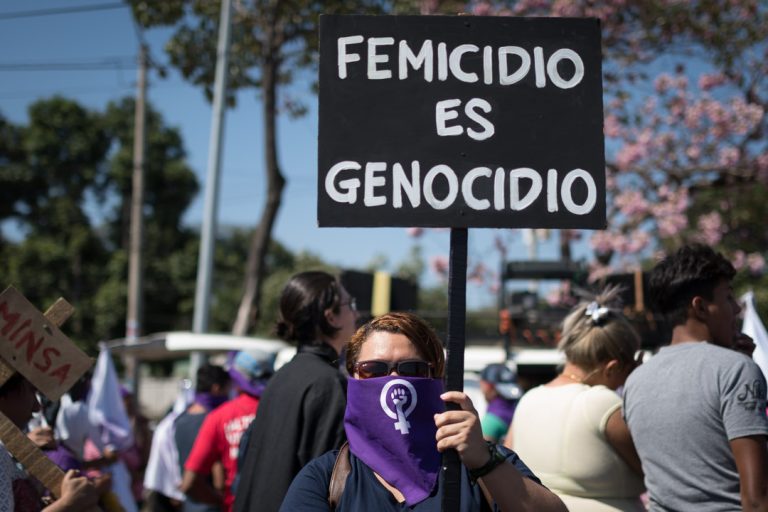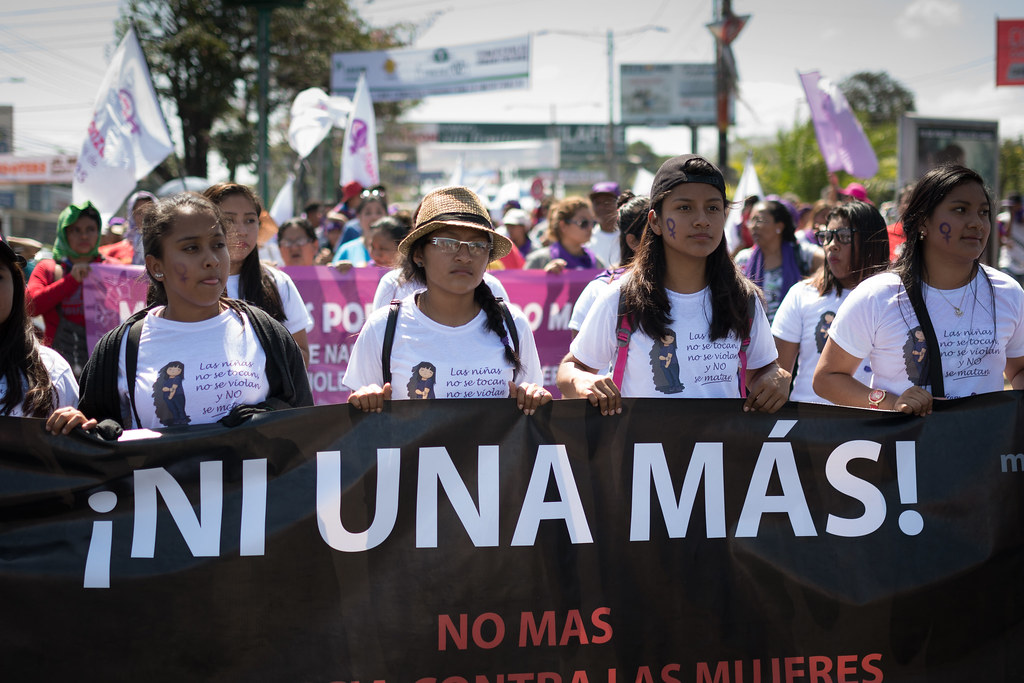2 de octubre 2020

Children of Exile: The Births “Sowing Hope” in the Camp of Nicaraguan Farmers

PUBLICIDAD 1M
PUBLICIDAD 4D
PUBLICIDAD 5D
Women assume new leadership roles after the April 2018 Rebellion in Nicaragua

Marcha del 8 de marzo, Día Internacional de la Mujer, en Managua. Carlos Herrera | Confidencial
The horrifying number of femicides in recent months isn’t a coincidence but the result of a lethal combination. A complicit, repressive and violent state has combined with a society that is profoundly misogynist, classist, and racist. It’s not a coincidence either that the majority of the murdered and abused women were poor women. Not only poor but often of racially stigmatized or from the rural zones.
In Nicaragua, the State’s everyday discourse and policies meld with a narrative and practice of tolerating and covering up violence against women. Because of this, the political goal for women to have lives free from violence begins with recognition. We must recognize ourselves as subjects within the political processes. This means naming our history, roles, and supports, along with the tracks these have left.
Historically, as political processes advance, the roles that we women play in them become instruments for the growth of masculine leadership. These leaders continue ignoring the diverse interests and contributions of women in the struggle to form better societies. Given this, our resistance also expands into the disruption of what we understand as politics. We do this to create new imaginings, new lenses, allowing us to include and recognize ourselves in all our diversity.
The patriarchy is one of the greatest systems for the oppression of women, added to race and class, among other things. It supports the social construction of binary ideas in the world, and of institutions that sustain those ideas.
Different feminist views seek to reveal those oppressions, disrupting the worlds constructed as binaries. Politics, as is traditionally understood, sustains itself on one of those dichotomies by separating the public from the private.
Politics is socially understood as the decision-making process as applied to the public arena. This includes all activities that seek the exercise, modification or preservation of public power. This, in turn, relates to what is understood as “common problems” – all which takes place outside the home. In contrast, what is considered private is construed as not political. That’s the domestic environment, comprised of the dwelling and the family relationships. These are spheres whose fundamental responsibility has historically fallen on women.

"Ni una más" se lee en una pancarta en marcha por los derechos de la mujer, el 8 de marzo de 2018, en Managua. // Foto: Carlos Herrera
Amid our diversity, we women are responsible for at least two fundamental contributions to Nicaragua’s current historic process. One is the epistemic contribution, linked to the notion and form of conducting politics. The other is our influence on the contents and the agenda of a broad social movement. That is the idea of a new social contract.
In terms of our contribution to the cumulative history of Nicaraguan politics, women’s and feminist organizations spent decades consolidating networks. These have been amplified by others that arose organically in April 2018. Together, we’ve created a set of spaces offering solutions to collective problems that deepened as the result of the repression.
Women’s efforts have succeeded in guaranteeing safe places, health, and medicine for people being persecuted. In addition, these spaces have responded to the needs of the political prisoners; articulated innovative systems of psychological attention during a crisis; and organized systems for monitoring and documenting human rights violations.
All of these networks were led and sustained principally by women. Nonetheless, they haven’t necessarily been recognized as political spaces. In the binary culture that I mentioned previously, caring for people and attending to the private sphere isn’t seen as political. That term is reserved for she who seeks to assume [control of] power and the state. In addition, caregiving is supposedly our responsibility.
Hence, our participation in the struggle for life and liberty is socially mediated by the “qualifying category” of being some man’s partner, daughter, or mother. According to androcentric politics, HE is the principal “political subject”, and she is there to care for and protect him.
Women make a contribution to politics by reconstructing the consciousness of the political and articulating it with different dimensions of reality. However, in order to make this contribution visible, we must make a leap and politicize the work of caregiving. If we don’t we’ll only have gone from caregiving in private to caregiving in public. We won’t achieve the transfer of these responsibilities to the collective, and thus the State and the community.
Another aspect of this involves our contribution to the political contents and agenda of the broad social movement. The consensus built since April 2018 recognizes three key elements as central to the struggle: democracy, liberty, and justice.
Women in Nicaragua have raised our voices and put our bodies on the line for all three. However, our most fundamental role has been in the struggle for justice. In a country where impunity has prevailed for 199 years, women have placed on the table the topics of justice, reparations, and no repetition. These form the foundations of a new social contract. This, in my judgment, is the most transformative achievement that came out of April 2018. It has been led, shaped, and moved largely by women.
We, women, have held leading roles in the political fight for justice because we’ve been fundamental in the broad movement to defend human rights. We’ve struggled for the rights of the murdered and the political prisoners. We’ve been the ones to raise our voices, to oppose and denounce all intents of impunity. We’re the ones that have struggled and put our autonomies in the center. Above all, we’re the ones that have concretely named the country’s ineludible agenda: truth, criminal justice, remembrance, reparations, and guarantees of never again.
Moreover, the aforementioned challenges these past two years brought us other challenges we must reflect and act on.
One of them is the leadership roles among women. Beginning with the April explosion, women have been at the forefront of organizing processes, constructing dialogues and political alternatives. But we’ve remained largely in the shadows. Men continue occupying the public arena, and in this way, institutional power continues to be exercised by men.
Overcoming this challenge involves, among other things, disrupting the way that gender has been colonialized in our heads. This is tied to a religious legacy that views our contributions as part of a ministry that shouldn’t need recognition. Our activism and resistance are further politicized when we accept that it’s fine to take credit for what we do. Likewise, when we recognize that many times it was our contributions that aided or made possible the achievements.
Another challenge is that of accompanying the women who have assumed visible leadership in the blue and white spaces. These women often find themselves somewhat obstructed and find themselves alone within these spaces. They’re a minority when it’s time to promote feminist agendas or those from a woman’s angle. In many cases, they’re also isolated. Creating more platforms or strengthening the existing ones is important. These allow us to continue sharing experiences, discussing agendas and feminist views, and creating or strengthening the spaces for common actions amid our differences.
One final challenge is combatting macho violence. In several of these blue and white spaces, we must resist not only the State’s violence but also that of others in that space. We must call out aggressions that, in some cases, have been tolerated, normalized, and seconded.
These challenges also imply thinking about how to politicize the processes. February of this year brought an explosion of denunciations of aggression [against women]. That was important since many women managed to break the culture of silence. It’s also true that politicizing violence doesn’t necessarily mean making all cases public. Combatting the many cases of violence can assume different forms and meanings.
Politicizing this work involves continuing the creation of secure networks and platforms. We must also continue placing our bets on policies of no tolerance. Above all, we must all be sure that women believe us and back us up.
Archivado como:
PUBLICIDAD 3M
PUBLICIDAD 3D